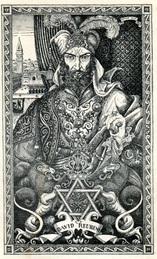Medieval Jewish History
Alanna E. Cooper
Fall 2012
SESSION 9: The Land of Israel

SESSION OVERVIEW:
We’ve looked at two different strategies Jews used to contend with the difficult vicissitudes of life in the Middle Ages. (1) the creation of strong local communities and institutions (2) the elaboration of strong far-reaching networks, which included overlapping social, familial and economic ties.
Now we turn to a third strategy – one that was not as practical, but provided Medieval Jews with a sense of hope for a better future, and a feeling that they did, indeed, have some place in the world that they could call “home” where they might one day find themselves under sovereign rule. I’ll call this strategy: Turning towards the Holy Land.
We’ll discuss this topic drawing on three reading selections.
We’ve looked at two different strategies Jews used to contend with the difficult vicissitudes of life in the Middle Ages. (1) the creation of strong local communities and institutions (2) the elaboration of strong far-reaching networks, which included overlapping social, familial and economic ties.
Now we turn to a third strategy – one that was not as practical, but provided Medieval Jews with a sense of hope for a better future, and a feeling that they did, indeed, have some place in the world that they could call “home” where they might one day find themselves under sovereign rule. I’ll call this strategy: Turning towards the Holy Land.
We’ll discuss this topic drawing on three reading selections.
READINGS:
(1) The final chapters of Hillel Halkin’s Yehuda HaLevi.
(3) “A Zionist Experiment in the XV Century." Find this here
NOTES ON READINGS
(1) Yehudah HaLevi:
(2) The letters of Obadiah Bertinoro (Read here)
Ovadiah ben Avraham was a spiritual leader, still well known today for his commentary on the Mishna. He lived most of his life in Italy, until he moved to the Holy Land at the end of the 15th century. His letters to his family back home give a rich account of the spiritual, social and economic life for the small Jewish population that made their homes there at the time.
(3) “A Zionist Experiment in the XV Century” (Read here)
This brief article describes David Reubeni, an eccentric (delusionsal?) fifteenth-century character (pictured above in this 1930 pen ink lithograph by Arthur Szyk). He travelled among conversos (Jews who had converted to Catholicism in Christian Spain and who had scattered to various places across Europe) and visited European Statesmen, working to attain a goal that was un-heard of at the time: To claim Jewish sovereignty in the Land of Israel, and to organize a massive Jewish migration there.
(1) The final chapters of Hillel Halkin’s Yehuda HaLevi.
- Chapter 6: Yehuda Halevi Set Sail
- Chapter 7: Yehuda Halevi's After-Life
(3) “A Zionist Experiment in the XV Century." Find this here
NOTES ON READINGS
(1) Yehudah HaLevi:
- I am particularly interested in how Ch.7 illuminates the condition of (mostly non-existent) Jewish life in the Land of Israel in the 11th and 12th centuries.
- Ch.8 takes a very different turn - showing the ways in which Yehuda Halevi writings and personal life experience influenced the way Jews thought about the Land of Israel for many generations to come.
(2) The letters of Obadiah Bertinoro (Read here)
Ovadiah ben Avraham was a spiritual leader, still well known today for his commentary on the Mishna. He lived most of his life in Italy, until he moved to the Holy Land at the end of the 15th century. His letters to his family back home give a rich account of the spiritual, social and economic life for the small Jewish population that made their homes there at the time.
(3) “A Zionist Experiment in the XV Century” (Read here)
This brief article describes David Reubeni, an eccentric (delusionsal?) fifteenth-century character (pictured above in this 1930 pen ink lithograph by Arthur Szyk). He travelled among conversos (Jews who had converted to Catholicism in Christian Spain and who had scattered to various places across Europe) and visited European Statesmen, working to attain a goal that was un-heard of at the time: To claim Jewish sovereignty in the Land of Israel, and to organize a massive Jewish migration there.
